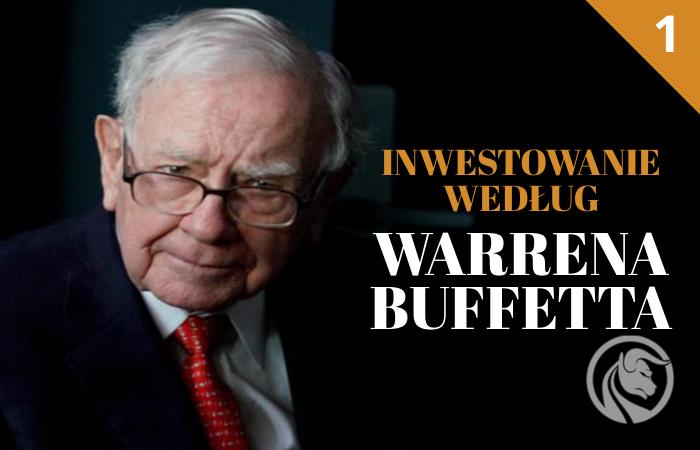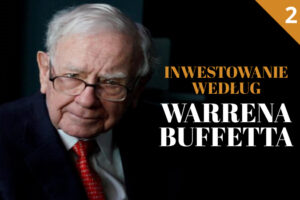Investing in Simple Business Models According to Warren Buffett. Th. AND
Warren Buffett is undoubtedly an icon of long-term investing. His rules are based on simple rules which, as he himself says, are ignored by most professional managers. Its portfolio includes leading giants. He has been a shareholder of Coca Cola for a long time. He repeats many times that the best time to invest in stocks (read: having them in your portfolio) is eternity. This statement tells us a lot about the style in which he invests his capital. Thanks to this, we will be looking for companies with sound financial foundations and generating profits with good, long-term dynamics.
In this article, we take a look at the ways Warren Buffett selects stocks for his portfolio. We invite you to read.
What does the oracle invest in?
In order to fully understand the concepts of investing in value that Warren Buffett presents, it is worth taking a look at the companies he has bought at different times in his life (and which, by the way, he has mostly owned up to now). Therefore, we need to ask ourselves what companies are attracting Buffett's attention? I think one of the many key factors is the amazing business history. The company must have an idea consistent with its concept of operation and tradition.
One of Warren's most famous investments (and favorites) is Nebraska Furniture Mart. Buffett called this company Perfect because of the values it conveyed to the client. What was it about the NFM? It was led by a woman who escaped from Russia to the USA after the First World War. At the age of 23, without school and without the ability to speak English, she started a modest trade in clothing. She set aside $ 500 and started a furniture business. She worked there until she was 99 (no, no mistake). In 1983, she sold 90% of the shares to Buffett for $ 55 million. This example shows what projects and people Buffett was willing to engage in. As he said himself, a good reputation, customer orientation as well as hard-working and honest management staff are the best determinants for an investor.
Psychologist or investor?
Warren Buffett pays a lot of attention to the people behind the company's success. Therefore, they are diligently applied to their evaluation. The above example of an NFM is ideal to show that the honesty, diligence and confidence that Warren has in it is synonymous with the ease with which he is investing money in a venture that such an entity carries out. His father had a great influence on such and not other values which were guided by Buffett. The oracle repeated his words many times in numerous interviews. They read: "never do anything you and your family would prefer not to read in front of a newspaper".
READ NECESSARY: Warren Buffett - The story of the oracles of Omaha [Great Traders]
I think it's hard to find another person as nice and warm as Warren among billionaires and investors. He managed to make a fortune with hard work without losing friends and good relations with his family. He did it honestly and without much publicity, without losing respect for others. He looks for exactly such features in the managerial structures of the companies he is interested in and in the personalities of the owners themselves. If we take a closer look at it and even look at the current market of widely understood companies and brands, we focus on those that are authentic to us in their activities. We are more willing to buy products of honest companies with a unique approach to the customer as an equal man and to a large extent part of the business.
Graham "raised" Buffett
Warren says repeatedly that there is "something" to Graham about his investment style. This is because, as a young man, Buffett wanted to work for Graham's investment firm. Leaving aside the story of the rejection of his candidacy and of the stubbornness of young Warren to finally get a job with his mentor, we will move on to the more important part related to the very philosophy he took and perfected from him. Certainly, Warren's investing style may at first glance be practically quite similar to Benjamin's, especially when we look at his first investment decisions. However, there are quite a few differences and aspects that Buffett disagreed with.
You can find out about Graham's investing style in a separate article. Nevertheless, it focused on enterprises with high levels of tangible net assets. He argued that sooner or later they would provide the company with good profits, and such a company would be more resistant to changes in the economic situation. He had two categories in mind - quantitative and qualitative, the transition of which determined whether he would buy the company. Over time, Buffett began to deviate from the restrictive model of his mentor. Why? Most of these companies were average and undervalued, but their market "appreciation" usually did not reach the estimated price in the perspective of even a few years. The profits from this model were therefore very neutral compared to those generated by a large part of the professional market. Warren observed that, to a large extent, Graham's enterprises were companies that performed very mediocre in industries that had flourished long ago.
New ideas
Much of Warren's investment was stocks of companies that did not fit Graham's model as it favored companies with high levels of tangible assets, excluding those whose value was intangible. Buffett noticed this error relatively quickly, correcting it for his investments.
The Oracle of Omaha ensured its success thanks to the skill of meticulous analysis of the company. This is not just an analysis indicators in classic cases, but largely getting to know the management and focusing on a few financial values, which Buffett usually does not count exactly, but simply estimates in the world. What's more, behind the numbers there is a "living" company that tries to get to know it from different perspectives - investor, customer or employee. It is guided by the words of Benjamin Graham, who wrote that "investing is the smartest when it resembles a business".
READ: How do I buy Berkshire Hathaway stocks? Everything about investing in Buffetta
It may be helpful to imagine, when acquiring a specific block of shares, that you are buying not a part of the shares, but the entire enterprise. What is this thought prompting us to do? Mainly to answer the questions, what are my company's strengths and weaknesses compared to the competition? Who are my competitors? What value do I bring to clients? What makes me wonder about the company? What is bothering me?
My company
In this context, Buffett has repeatedly asked himself what characterizes a good enterprise. This response must be very flexible, taking into account the broad structure of the market, recipients, suppliers, consumers and factors. They affect our company and we have little influence over them. There are a few specific criteria that Buffett pays attention to. One of them is, first and foremost, perspective. Perspective understood in the long run. The enterprise must have a competitive advantage that is difficult to duplicate and a stable market position. These two things affect your profit potential.
Another aspect is understanding the business model. This issue has often been compared to diving by Warren, where investing is against him as the level of difficulty of the actions is irrelevant. It is much easier to choose an enterprise whose operation depends on one understandable factor than a network of connections. The third important factor is the company's success-oriented management team. In these positions, Warren seeks people with a high sense of morality, trustworthy people who can be liked and admired for their results. They think about the company's development in the context of the good of the owners.
The last element in these general principles is the reasonable price of the security, which we will discuss in more detail later in this article.






















![Forex Club – Tax 9 – Settle tax on a foreign broker [Download the Application] Forex Club - Tax 9](https://forexclub.pl/wp-content/uploads/2024/02/Forex-Club-Podatek-9-184x120.jpg?v=1709046278)
![Trading View platform – solutions tailored to the needs of traders [Review] trading view review](https://forexclub.pl/wp-content/uploads/2024/03/trading-view-recenzja-184x120.jpg?v=1709558918)
![How to connect your FP Markets account to the Trading View platform [Guide] fp markets trading view](https://forexclub.pl/wp-content/uploads/2024/02/fp-markets-trading-view-184x120.jpg?v=1708677291)
![How to invest in ChatGPT and AI? Stocks and ETFs [Guide] how to invest in chatgpt and artificial intelligence](https://forexclub.pl/wp-content/uploads/2023/02/jak-inwestowac-w-chatgpt-i-sztuczna-inteligencje-184x120.jpg?v=1676364263)






![Izabela Górecka – “Success on the market depends not only on knowledge, but also on emotional stability” [Interview] Izabela Górecka - interview](https://forexclub.pl/wp-content/uploads/2024/04/Izabela-Gorecka-wywiad-184x120.jpg?v=1713870578)
![WeWork – the anatomy of the collapse of a company valued at $47 billion [WeWork, part II] wework bankruptcy story](https://forexclub.pl/wp-content/uploads/2024/04/wework-bankructwo-historia-184x120.jpg?v=1711729561)
![Adam Neumann – the man who screwed up Softbank [WeWork, part AND] adam neumann wework](https://forexclub.pl/wp-content/uploads/2024/04/adam-neumann-wework-184x120.jpg?v=1711728724)


![The most common mistakes of a beginner trader - Mr Yogi [VIDEO] Scalping - The most common mistakes of a beginner trader - VIDEO](https://forexclub.pl/wp-content/uploads/2024/03/Scalping-Najczestsze-bledy-poczatkujacego-tradera-VIDEO-184x120.jpg?v=1711601376)
![Learning patience: No position is also a position - Mr Yogi [VIDEO] Scalping - Learning patience - No position is also a position - VIDEO](https://forexclub.pl/wp-content/uploads/2024/03/Scalping-Nauka-cierpliwosci-Brak-pozycji-to-tez-pozycja-VIDEO-184x120.jpg?v=1710999249)
![When to exit a position and how to minimize losses - Mr Yogi [VIDEO] Scalping - When to exit a position and how to minimize losses - VIDEO](https://forexclub.pl/wp-content/uploads/2024/03/Scalping-Kiedy-wyjsc-z-pozycji-i-jak-minimalizowac-straty-VIDEO-184x120.jpg?v=1710336731)





![Warren Buffett - The story of the oracles of Omaha [Great Traders] warren buffett great traders](https://forexclub.pl/wp-content/uploads/2021/04/warren-buffett-wielcy-traderzy-300x200.jpg?v=1618564811)












Soon I will start working on my own. I would like to develop one that will bring you really good profits. Well, but we'll see how it turns out. Currently, I have focused on investing to make some passive profit for myself and I must admit that I have succeeded.